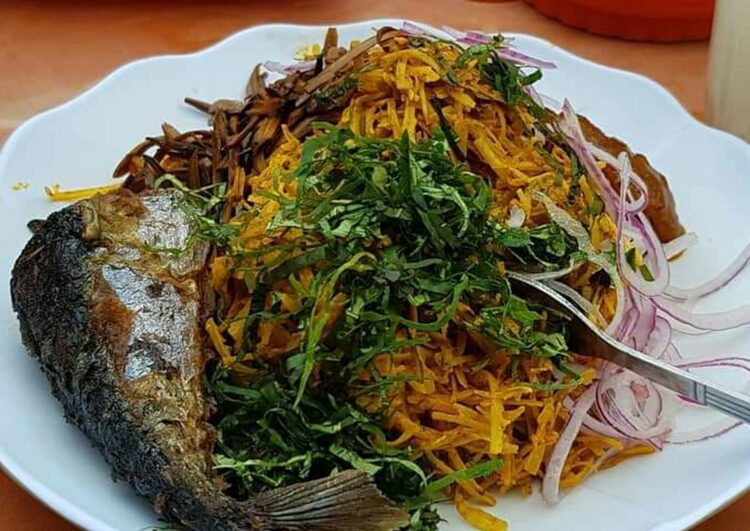The name Abacha has come to be known to mean different things in Nigeria. Abacha in Tiv means overnight food. This is usually a delight to children in the rural areas when their mothers would recook the food that was not finished from the previous day. The children normally eat it early before heading out to school on foot. In the townships, people still eat Abacha, uncelebrated.
In a dialect of the Kanuri language, Abacha means father. And as a Nigerian, who is not familiar with General Sani Abacha, the Nigerian former Head of state? He ruled Nigeria between 1993 to 1998. Apart from being the head of state, he was also the chief of Army staff from 1985 to 1990.
Abacha also served as the chief of defense staff from 1990 to 1994. There were quite a lot of political instabilities when Abacha was in power in Nigeria. This was caused by the annulment of the June 12 election which MKO Abiola won in the year 1992. There was a serious scarcity of kerosene back then after the annulment and it affected a lot of Nigerians.
Nigerians were hit by serious economic hardship. Kerosene for instance, became so scarce and expensive. Low-income earners could not even afford to buy a bottle of Kerosene because of the price. This difficulty led to the invention of the Abacha stove, which mainly made use of sawdust to prepare food. Abacha Stove metamorphosed into Charcoal stove and can be seen in many homes and Bukas till today.
The Igbos have an entirely different Abacha. For them, Abacha is food. This is a delicacy made of dry, shredded cassava. The Igbos call it in English, African Salad, and there are many variations to making this salad, but the more ingredients you add, the tastier the dish is. Some of the major ingredients are vegetable, particularly Utazi, Ukazi or Garden Egg leaf. Although some people use Lettuce, but leaves with a bitter taste are preferable. There also has to be Ugba, the fermented African oil bean which is like the icing on the cake. Other ingredients include crayfish, pepper and onions. All the vegetables and onions have to be un-cooked.
21st CENTURY CHRONICLE caught up with Mrs. Charity Amos on the street in Kubwa, Abuja. After explaining how the casava, which is the main ingredient for Abacha is prepared, Amos went on to explain how the sauce is made. The method for making the sauce is a little tedious and needs some expertise in cooking it, but is mainly made from palm kernel fruits. Asked if it is Banga soup, Amos quickly said, ‘’No, it is entirely different.’’ But the texture looks almost like Banga soup, a kind of sauce popular in the South South region of Nigeria.
Amos is a mother of five children including a set of twins and a one-year-old baby. She has been selling Abacha on the streets since 2011, and said this has helped her pay her four children’s school fees since she started the trade. Her husband, who is a petty trader in clothes, supports the family with feeding, house rent and in doing some house chores. And while she is out, her older children take turns with her neighbor to care for the one-year-old, between going to school. So Amos is able to commute between Gwagwa and Kubwa to sell her Abacha.
This seeming small scale business, Amos said helps her raise almost N10,000 daily, from which she saves N5,000 each in two weekly contribution schemes. This is the money from which “I pack and pay my children school fees,” she said.
So, on average how many customers does Mrs. Amos sell her Abacha to every day? She said, ‘’I normally come out with 25 packs of take away plates.” And often times, she would need to divide the ‘’take away into two because they are not enough,” she said. So, from this calculation, Amos suggested that she sells to more than 30 people on a daily basis. A plate of her Abacha goes for between N350 and N500, depending on if it was served with ‘kpomo’, cow skin or fish.
Asked who makes the most of her customers, Mrs. Charity Amos said, “Abacha is healthy and safe for everyone, even pregnant women, so everyone buys. You can eat it as a snack or a full meal. Whichever way you prefer to eat it, warm or cold, it will still come out delicious.”
On safety in pregnancy and nutrition, Hajia Hafsat, a trained nutritionist told 21st CENTURY CHRONICLE that “Abacha is safe and healthy in pregnancy if it is not prepared with potash. Potash (akanwu) can cause miscarriage and birth defects in babies.”
She then advised that any pregnant woman craving Abacha should ensure that they eat the one made without akanwu.









